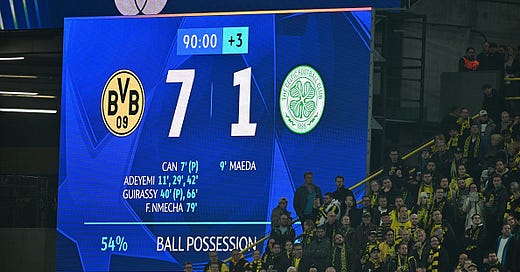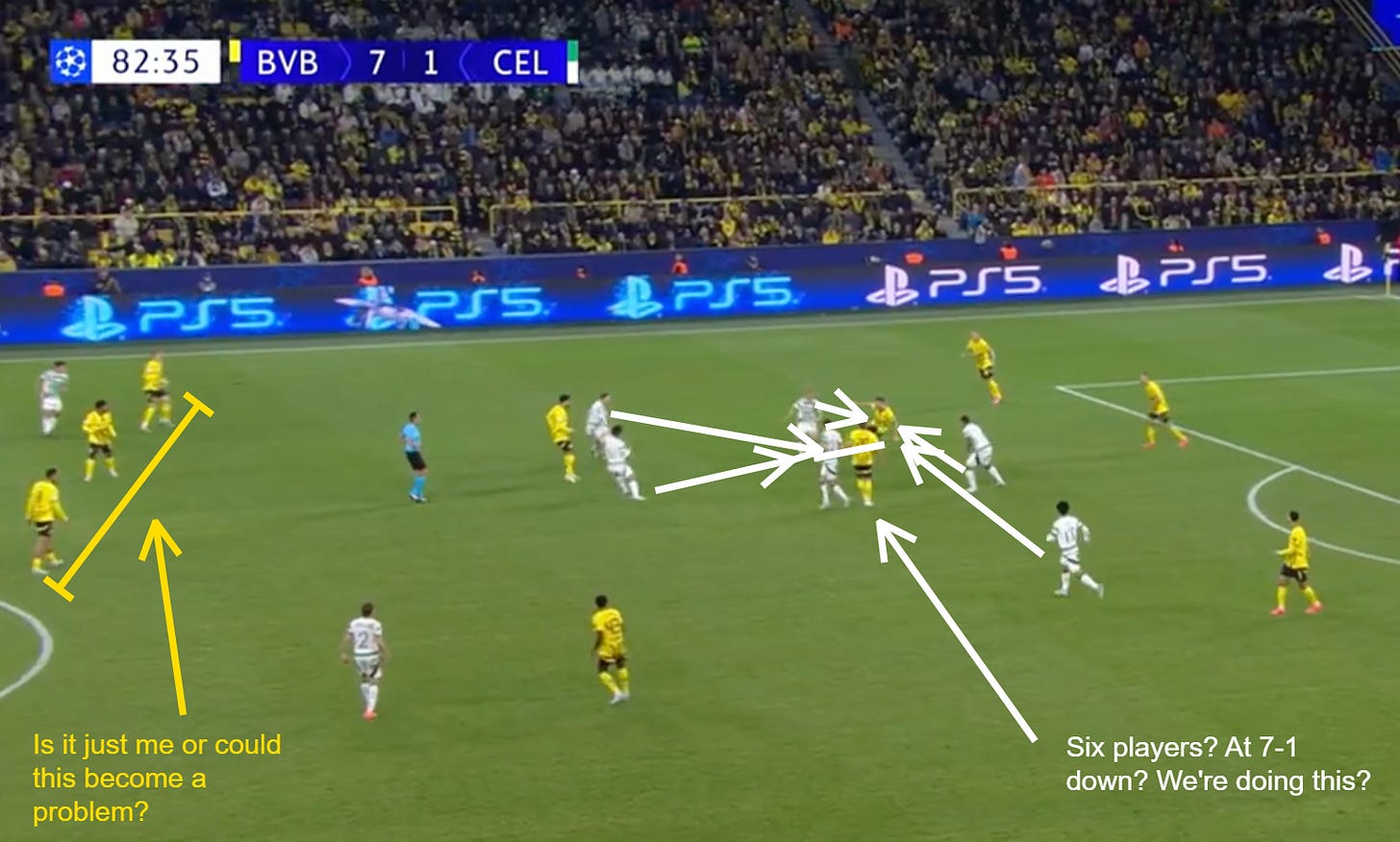Celtic in Europe: Satékroket, Slices and Shellackings
Tactical naivete and financial inequality? Yes, but Celtic's domestic dominance does not prepare them adequately for nights like Dortmund
Adam Clery is FourFourTwo’s ‘tactics guy’ and has built a huge following with his insightful, clear-eyed analysis. The magazine’s YouTube channel - built around his digestible and hugely entertaining tactical breakdowns - now has 600,000 followers. We are delighted to welcome Adam as Nutmeg’s new monthly tactics columnist
By Adam Clery
For 58 days since the start of the season, Celtic had conceded just once in the Premiership league and once in the Champions League. The latter was an almost out-of-nowhere top-corner strike from Slovan Bratislava centre-back Kevin Wimmer, that only even materialised onto this mortal plane because Greg Taylor’s clearance was so comedically sliced that it quite possibly made a cartoon ‘whoooooops’ noise as he did it.
They scored five regardless, and ran out emphatic winners on a night dubbed their ‘real test’. But what followed in Dortmund was that rarest of footballing treats: a legitimate and watertight excuse to use the word ‘shellacking’. Try saying it out loud. Right now. Don’t worry about who’s looking. You’ll feel alive.
There’s simply nothing in football quite like watching a team so consummately dominant at home get so ritually humiliated abroad. But even by the usual standards of footballing schadenfreude, the disparity here was staggering.
The stats, as dry as they are, make for a punishing read. Celtic are now a galling 31 defeats in 40 Champions League away games. They have the highest ratio of those losses for any team to have played 50 games or more in the competition. Felix Nmecha’s 79th-minute strike brought them up to an even 100 goals conceded abroad in the Champions League. Yikes, yikes and, indeed, yikes.
In parts of the Netherlands they serve something called satékroket. They take a peanut sauce, mix it with meat, clump it together with flour, deep-fry it, and serve it in a stale bun with a napkin. It is the only place in Europe you will find a more consistently unpleasant battering than Celtic’s away record. But while hands are being wrung and pearls are being clutched over what this means for the new Champions League format, it’s what it says about the inequality in Scottish football that feels somehow grimmer than even that aforementioned Dutch street food.
Dortmund had 13 shots on goal during that game which, while a lot, isn’t unheard of. However Kilmarnock, Hibs, St Mirren, Rangers, Hearts, Falkirk and St Johnstone – Celtic’s Scottish opponents prior to that match – mustered a combined 10. Therefore you might well have your Christmas tree up by the time Kasper Schmeichel dirties his gloves again domestically. The Rangers game aside, Celtic have averaged somewhere in the region of 75 per cent possession in the league so far. Manchester City, one of the most possession-fetishising teams in the world, and whose dominance you regularly hear has ruined the English game as a competition, are averaging 62 per cent. Real Madrid, who keep adding The Best Player In The World to their team of The Best Players In The World, are at 61.
Celtic then enjoy nearly 25 times the revenue of St Johnstone. I promise you this one isn’t a typo: while Dortmund’s squad cost them six times what Celtic’s did… putting The Bhoys together set them back 185 times as much as the price of assembling The Saints.
any mistakes they make aren’t getting punished by players of continental standard
It’s a combination of dressing-room whiteboard and balance-sheet inequality that makes Brendan Rodgers’ position in the Champions League nearly impossible. His side are simply not required to play in a way that would ever adequately prepare them for coming up against superior opponents. Even on the rare occasions they are forced to sit in, congest space, and be ‘hard to beat’, any mistakes they make aren’t getting punished by players of continental standard.
Take a look at the sides that have punched above their continental weight in recent years. Copenhagen, Slavia Prague, Dynamo Zagreb – teams Celtic rightly wouldn’t consider to be any better than they are – all ply their trade in leagues that aren’t a foregone conclusion. The Danish side took points off Bayern Munich and Galatasaray last season, as well as beating Man United, but were also embroiled in a gruelling four-way title race. They spent as many games grinding out tight points against Midtjylland and Brøndby as they did plastering the walls with the hopes and dreams of Hvidovre. It doesn’t make them a ‘better’ side in terms of overall ability, but it does require them to develop a sense of guile to complement their quality. It’s a perverse reality, but would Celtic be better in Europe if they were in some way worse in Scotland? Probably.
In the Dortmund game there was a moment that would, were it a dream, have seen Rodgers sit bolt upright in bed, screaming and sweating, vowing to change his ways. Taylor receives the ball at the back and drives them up-field down the left. He exchanges passes with Callum McGregor in the final third, before Reo Hatate tries to find a killer ball between the defence for the buccaneering run of Arne Engels from midfield. But it’s cut out, and as six Celtic players swarm the edge of the Dortmund area to try and win it back, it’s incisively fired forward to launch a counter. Julien Duranville baits Liam Scales into a rash tackle on the halfway line, escapes him, and charges the entire remaining length of the pitch only to be denied by a strong arm from Schmeichel.
By any usual measure this is just the inevitable risk associated with a team fearlessly taking on their opponents as equals. But this was in the 82nd minute! When the score was 7-1! To continue swinging punches when you’re already in the back of an ambulance with a neck brace on isn’t just strategically misguided, it’s deranged. But, for Celtic, who spend 75 per cent of all their sparring time never having to worry about putting their guard up, what else can they do?
With a trip to Atalanta next up, Rodgers, undeniably, has problems that he needs to address. But the fundamental issues in Scottish football sit a lot closer to home, and they will still be pressing long after Celtic return from Italy.







Easy to blame the lack of domestic challenge but to still be committing as many men forward at 7-1 rather than trying to limit the damage is all on Rodger’s and his tactical naivety.
So it might even be in Celtic's own interest to share the Champions League wealth with the rest of the league?